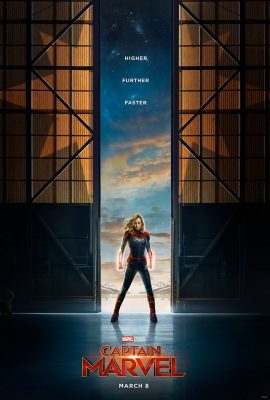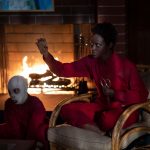
“Captain Marvel,” the first female led-installment of a 21-film long franchise, is an important milestone for representation in blockbuster cinema.
So it’s frustrating that this watershed moment is packaged inside another standard, serviceable yet perfectly fun Marvel superhero movie that’s more akin to Marvel’s safer “Phase One” films than their creatively fulfilling recent outputs.
An early scene in “Captain Marvel” features the titular heroine Carol Danvers (Brie Larson) sparring with her commander Yon-Rogg (Jude Law). During the session, Yon-Rogg barks at Carol to suppress her emotions, as they make a warrior vulnerable.
It’s clear what this scene is meant to convey — institutional discrimination that often frames women as “too emotional” to effectively lead. “Captain Marvel” develops this idea throughout its runtime as Carol discovers that her emotions are a superpower in their own right.
Yet, rarely does “Captain Marvel” develop uniquely female throughlines such as this, which connect to the larger story. While Carol does elevate herself above the roles others have defined for her, the film wears these themes too lightly.
Instead, “Captain Marvel” feels more committed to thinking up quippy lines, providing connections to the larger Marvel Universe and staying strictly within the predefined range of what a Marvel film should be.
That’s not to say the film is bad. Rather, the longevity of the Marvel Cinematic Universe proves that their way of making fun, light-hearted films is effective.
Furthermore, there’s value in normalizing stories about women by not making every one of them an event. But a heroine as trailblazing as Captain Marvel deserves a film that matches that spirit.
“Captain Marvel” opens on the home-planet of the Kree, a group of super-powered space police in which Carol is a member. After a battle with a shape-shifting alien species known as the Skrull, Carol is captured and flashes of memory regarding her life on Earth are awakened.
Carol escapes, crash lands in Los Angeles in the mid-1990s and is quickly discovered by S.H.I.E.L.D. agent Nick Fury, played by a de-aged Samuel L. Jackson, who helps her uncover the secret behind her fractured memory.
“Captain Marvel” toys with the structure of superhero films by establishing details — such as the origin of Carol’s powers and her friendship with an airforce pilot — as Carol remembers them. Thus, there’s a distinct lack of introductory information in the film. The audience is thrown headfirst into the narrative without first understanding Carol’s personal relationships.
While this is likely intended to mirror Carol’s fish-out-of-water confusion onto the audience, the side effect is that Carol has to be told about her relationships with supporting characters. It doesn’t feel like there’s a history behind Carol and these characters.
Carol’s amnesia further hinders her characterization: how is the audience supposed to understand Carol if Carol doesn’t even understand herself?
However, Larson allows Carol’s character to feel distinct and well-realized. If there’s any reason to see “Captain Marvel,” it’s Larson’s relaxed, confident performance that elevates the character above the script.
Carol’s story is a space opera, a buddy-cop comedy, a flashback-laced mystery and a story designed to tie in larger themes of the Marvel Cinematic Universe. All of these elements overburden the narrative, but Carol’s antics with Nick Fury shine through.
In the “Avengers” films, Jackson’s role as Nick Fury was more of a plot device than anything else. Here, he explores Fury as a character, which, combined with his easy chemistry with Carol and a distinctly ‘90s sense of humor, makes this section of the film ripe with charm.
The film is tied together using this ‘90s aesthetic — Carol wakes in a Blockbuster store after her crash landing, the film’s soundtrack is filled with TLC and Nirvana, and even the Skrulls look like Star Trek characters with their lizard-like prosthetic makeup.
One of the Skrulls, Talos (Ben Mendelsohn), is the film’s hidden pleasure. Mendelsohn chews the scenery in the most delightful way possible as he offers wry humor, menace and a surprising amount of depth to Marvel’s newest villain.
Mendelsohn had worked with the film’s two directors, Anna Boden and Ryan Fleck, in the past.
Boden and Fleck come from a background of charming, intimate character dramas such as “Half Nelson” and “Mississippi Grind.” However, the pair’s indie sensibilities, which do manifest themselves in the film’s quieter moments, are drowned out by spectacle. Notably, the film’s action sequences are rote, muddled and anonymously shot.
Even if “Captain Marvel” is dwarfed by spectacle and a need to further the Marvel brand, Boden and Fleck provide a solid, fun and oftentimes hilarious foundation for the film.
So why does “Captain Marvel” feel like a disappointment? Perhaps because the first female-led MCU film deserves to be something more than just fine with a few bright spots.




